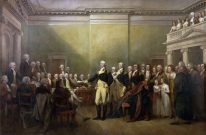Washington understood that martial strength secured independence, but republican government would require moral fortitude.
The Political Dangers of Rising Political Correctness
When I was inducted into the academic honor society at the Phillips Exeter Academy, we heard from an outside speaker, an academy graduate and a professor who happened to be an African American. Among various inflammatory remarks, he said he was surprised to hear an Irish name on the list. I shrugged off his comments, and my father, only a generation removed from the old country, still treasures this anecdote more than any other from my education.
At Phillips Exeter today, there is less tolerance for certain kinds of provocations—or even pre-provocations—than others. Last month an academy graduate and former Congressman was prevented from teaching a guest seminar because he was alleged to be an Islamophobe based on his connection with a Washington think tank. although his proposed seminar had nothing to do with Islam. (I would link to discussion of the matters in the student newspaper, but references appear to have been deleted recently—itself perhaps a sign of censorship and cover-up). On the other hand, one of Exeter’s own teachers penned an essay attacking “white privilege.” Thus, I guess it is not entirely clear how the comment at my ceremony would be treated today.
That’s one of the problems with political correctness: its high double standards informed by Left identity politics. And PC seems to be becoming a much greater problem at our high schools. A recent article reported on outrage that a white student at Boston Latin, an elite public high school, may have said that being black would ease the way to college admission. But this kind of comment is rooted in facts. African American students are admitted to elite colleges with substantially lower grades and test scores. Perhaps such racial preferences are a sound policy, but it appears that the Boston public schools are determined to suppress casual references to it.
The descent of political correctness into our high schools—particularly elite ones—suggests more political trouble ahead. The strength of Sanders and Trump—our two most illiberal candidates for President—comes in some substantial measure from the distortions of our education system. Sanders is the new candidate of the faculty lounges (a lot of my colleagues support him), and his ideas appeal to young people who have not heard the powerful critiques of socialism given the composition of academia today. Trump, on the other hand, cloaks his illiberalism in a shout out against political correctness.
It is not surprising that such candidates arise in an illiberal intellectual culture. Classical liberalism was born from its opposite: the liberal intellectual culture born of the Enlightenment, where many spoke harshly about norms that were considered sacred in their own era. Voltaire may not have been an Islamophobe, but he was certainly a Christophobe. Free thought promotes freedom generally. Our politics are only likely to become healthier when our elite educational institutions promote an even-handed tolerance of provocation and debate.

